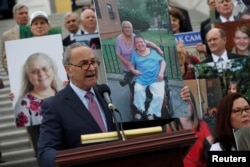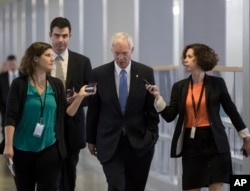The Senate's Republican leaders postponed a vote on their plan to overhaul America's health care system Tuesday as more Republicans joined Democrats in opposing the bill after Congress' nonpartisan analytical office projected it would cause millions of people to lose health care coverage.
Majority Leader Mitch McConnell of Kentucky insisted the battle was not lost and that efforts would continue to tweak the bill in hopes of attracting more support.
"It's a very complicated subject," McConnell said. "We're going to press on. We think the status quo is unsustainable."
Written in secret and unveiled as a draft version last week, the Better Care Reconciliation Act (BCRA) aims to fulfill a central Republican promise to voters: repealing and replacing former President Barack Obama's signature domestic achievement, known as Obamacare.
"The [voting] schedule may have changed a little bit, but one thing that hasn't changed is that Obamacare is collapsing," said Republican Senator John Thune of South Dakota.
Provisions
The Republican plan ends Obamacare's requirement that most Americans buy health insurance, offers tax breaks to encourage coverage and scales back funding for Medicaid, which pays medical expenses for the poor and disabled.
A report issued Monday by the Congressional Budget Office estimated that if the Republican bill was enacted, 22 million fewer Americans would have health care coverage over the coming decade and that some Americans would have to pay more for the same level of coverage they currently possess. At the same time, the CBO projected a savings of more than $300 billion to the federal government.
"I will vote no," Republican Senator Susan Collins of Maine wrote on Twitter, adding that the BCRA would "hurt most vulnerable Americans."
Collins is one of at least five Republicans opposing the bill, which can withstand only two "no" votes from the caucus and still gain Senate passage, given unified Democratic opposition.
"We're here to implore our Republican colleagues: Turn back from this bill," said Minority Leader Chuck Schumer, a New York Democrat, speaking on the steps of the Capitol. "Don't take health care away from people who need it most to give a tax break to those who need it least."
Democrats have acknowledged that Obamacare has shortcomings, but they urged Republicans to work with them to fix the program rather than terminate it.
State governors, meanwhile, also were weighing in, noting that individual states would assume more health care costs for their residents under the Republican plan.
"Not acceptable" is how Republican Governor John Kasich of Ohio described the Senate bill: "Who would lose coverage? The mentally ill, the drug-addicted, the chronically ill … and the working poor."
Senators of both parties said their offices have received a steady flow of calls and emails from constituents opposing the bill. Recent days have seen dozens of demonstrators arrested on Capitol Hill.
Trump 'very involved'
For now, however, Republican leaders are sticking to their "repeal and replace" mantra, as is President Donald Trump, who invited Senate Republicans to a meeting Tuesday at the White House later in the day.
"The president's been very involved," McConnell said. "He wanted to talk to all of us today. I think that's helpful."
McConnell had aimed for a Senate vote on the Republican plan this week before Congress adjourns for the July Fourth holiday. Health care reform is seen as the linchpin for other items on the Republican legislative agenda, including an overhaul of the federal tax code.
In both the House and Senate, divides have emerged between moderate Republicans who want to preserve the federal safety net for health care and ultraconservatives who want to reduce it.
VOA's Ken Bredemeier contributed to this report.




